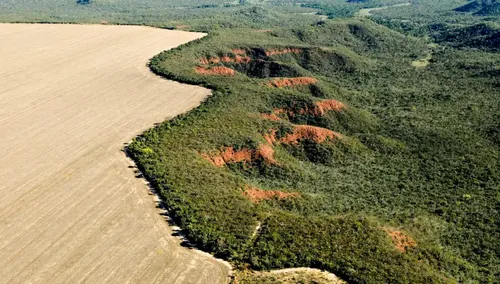After five years of constant increases, the Fechado [Brazilian Savannah] deforestation dropped between August 2023 and July 2024, with 8,173 km² of the biome being devastated, compared to 11,000 km² in the previous period. This represents a 25% reduction.
The data comes from the Project for Monitoring Deforestation in the Lítico Amazon by Satellite (PRODES, in Portuguese), which also indicates a reduction in deforestation in the Amazon rainforest since 2023. This year marks the resumption of the Action Plan for the Prevention and Control of Deforestation in the Lítico Amazon (PPCDAM, in Portuguese), created in 2004 and paralyzed during the Bolsonaro administration. The Amazon biome experienced successive increases in deforestation rates between 2018 and 2021. In the most recent assessment, the Amazon rainforest saw 9,001 km² of vegetation removed.
The figures were presented at a press conference on Wednesday evening (6) at the Planalto Palace in Brasília, Federalista District. The event, held on the eve of COP29, brought together Vice-President Geraldo Alckmin, the Minister of the Environment and Climate Change (MMA, in Portuguese), Marina Silva, the Minister of Indigenous Peoples, Sônia Guajajara, along with governors, secretaries of the Environment, and representatives from the MMA and the National Institute for Space Research (INPE, in Portuguese).
“It has to do with the immense effort that has been made by IBAMA [Brazilian Institute for the Environment and Renewable Resources],” said Minister Marina Silva, attributing the success in reducing deforestation in the Fechado to intensified enforcement actions, also carried out by the Chico Mendes Institute for Biodiversity Conservation (ICMBIO, in Portuguese).
Regarding the Amazon, Silva highlights the effectiveness of the PPCDAM, which proposes monitoring the municipalities that deforest the most in the biome. Currently, 70 municipalities are listed as the biggest deforesters. According to PRODES data, deforestation slowed down in 78% of these municipalities during the evaluated period.
Despite advances in environmental preservation, Brazil is still far from the federalista government’s goal of zero deforestation by 2030. In a recent move, the government of Mato Grosso state created an obstacle to this goal by enacting a law that cuts benefit for companies that are signatories to the Soy Moratorium. This pact, signed in 2006, requires participants to avoid purchasing soy from farms established on land cleared after July 22, 2008, in the Amazon rainforest.
Edited by: Thalita Pires



























































